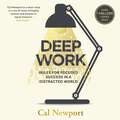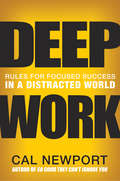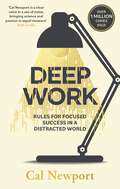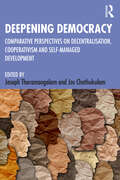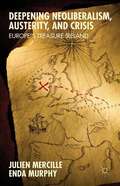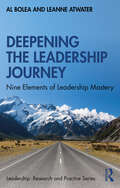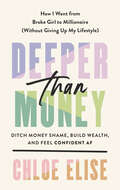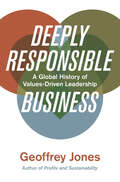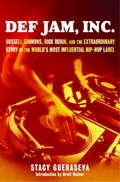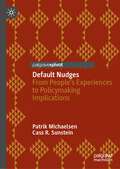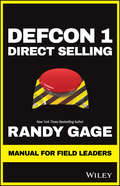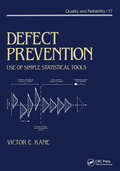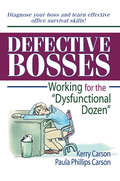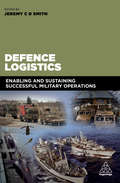- Table View
- List View
Deep Work: Rules for Focused Success in a Distracted World
by Cal NewportOne of the most valuable skills in our economy is becoming increasingly rare. If you master this skill, you'll achieve extraordinary results.Deep Work is an indispensable guide to anyone seeking focused success in a distracted world.'Cal Newport is exceptional in the realm of self-help authors' New York Times'Deep work' is the ability to focus without distraction on a cognitively demanding task. Coined by author and professor Cal Newport on his popular blog Study Hacks, deep work will make you better at what you do, let you achieve more in less time and provide the sense of true fulfilment that comes from the mastery of a skill. In short, deep work is like a superpower in our increasingly competitive economy.And yet most people, whether knowledge workers in noisy open-plan offices or creatives struggling to sharpen their vision, have lost the ability to go deep - spending their days instead in a frantic blur of email and social media, not even realising there's a better way.A mix of cultural criticism and actionable advice, DEEP WORK takes the reader on a journey through memorable stories -- from Carl Jung building a stone tower in the woods to focus his mind, to a social media pioneer buying a round-trip business class ticket to Tokyo to write a book free from distraction in the air -- and surprising suggestions, such as the claim that most serious professionals should quit social media and that you should practice being bored. Put simply: developing and cultivating a deep work practice is one of the best decisions you can make in an increasingly distracted world and this book will point the way.
Deep Work: Rules for Focused Success in a Distracted World
by Cal NewportAN AMAZON BEST BOOK OF 2O16 PICK IN BUSINESS & LEADERSHIPWALL STREET JOURNAL BUSINESS BESTSELLER A BUSINESS BOOK OF THE WEEK AT 800-CEO-READMaster one of our economy&’s most rare skills and achieve groundbreaking results with this &“exciting&” book (Daniel H. Pink) from an &“exceptional&” author (New York Times Book Review). Deep work is the ability to focus without distraction on a cognitively demanding task. It's a skill that allows you to quickly master complicated information and produce better results in less time. Deep Work will make you better at what you do and provide the sense of true fulfillment that comes from craftsmanship. In short, deep work is like a super power in our increasingly competitive twenty-first century economy. And yet, most people have lost the ability to go deep-spending their days instead in a frantic blur of e-mail and social media, not even realizing there's a better way. In Deep Work, author and professor Cal Newport flips the narrative on impact in a connected age. Instead of arguing distraction is bad, he instead celebrates the power of its opposite. Dividing this book into two parts, he first makes the case that in almost any profession, cultivating a deep work ethic will produce massive benefits. He then presents a rigorous training regimen, presented as a series of four "rules," for transforming your mind and habits to support this skill. 1. Work Deeply 2. Embrace Boredom 3. Quit Social Media 4. Drain the Shallows A mix of cultural criticism and actionable advice, Deep Work takes the reader on a journey through memorable stories-from Carl Jung building a stone tower in the woods to focus his mind, to a social media pioneer buying a round-trip business class ticket to Tokyo to write a book free from distraction in the air-and no-nonsense advice, such as the claim that most serious professionals should quit social media and that you should practice being bored. Deep Work is an indispensable guide to anyone seeking focused success in a distracted world.
Deep Work: Rules for Focused Success in a Distracted World
by Cal NewportOne of the most valuable skills in our economy is becoming increasingly rare. If you master this skill, you'll achieve extraordinary results.Deep Work is an indispensable guide to anyone seeking focused success in a distracted world.'Cal Newport is exceptional in the realm of self-help authors' New York Times'Deep work' is the ability to focus without distraction on a cognitively demanding task. Coined by author and professor Cal Newport on his popular blog Study Hacks, deep work will make you better at what you do, let you achieve more in less time and provide the sense of true fulfilment that comes from the mastery of a skill. In short, deep work is like a superpower in our increasingly competitive economy.And yet most people, whether knowledge workers in noisy open-plan offices or creatives struggling to sharpen their vision, have lost the ability to go deep - spending their days instead in a frantic blur of email and social media, not even realising there's a better way.A mix of cultural criticism and actionable advice, Deep Work takes the reader on a journey through memorable stories -- from Carl Jung building a stone tower in the woods to focus his mind, to a social media pioneer buying a round-trip business class ticket to Tokyo to write a book free from distraction in the air -- and surprising suggestions, such as the claim that most serious professionals should quit social media and that you should practice being bored. Put simply: developing and cultivating a deep work practice is one of the best decisions you can make in an increasingly distracted world. This book will point the way.
Deep-Buried Large Hydrocarbon Fields Onshore China: Formation and Distribution
by Suyun Hu Tongshan WangThis book analyzes the formation and evolution of the giant hydrocarbon reservoirs based on major basins onshore China. It discusses exploration and research advantages of major basins in China, such as Sichuan, Tarim, and Ordos Basins and also systematically analyzes and summarizes the formation conditions, distribution rules, and main controlling factors of deep oil and gas fields. On this basis, it forecasts the exploration prospect of China's onshore deep oil and gas, providing theoretical guidance and technical support for deep oil and gas exploration breakthrough and large-scale reserves growth. This book focuses on the analysis and discussion of hydrocarbon generation mechanism of deep-paleo source rocks, discusses the accumulation rules of cross-structural reservoir formation and oil-gas enrichment in ancient strata, the combination of gypsum-salt rocks and carbonate rocks, the potential of oil and gas accumulation under salt, the main controlling factors and distribution rules of deep oil and gas fields, and preliminarily grasps the geological understanding of the formation and distribution of deep-large oil and gas fields, namely ①abundant hydrocarbon supplied by two types of source kitchens, ②three large-scale lithologic reservoir rocks, ③hydrocarbon accumulation controlled by three paleoes (paleouplift, paleoplatform margin, and paleofaults), and ④reservoir formation across major tectonic periods. The book serves as a guidance for both researchers and students majoring in petroleum geology and other related fields.
DeepMap: Charting the Road Ahead For Autonomous Vehicles
by Shane Greenstein Nicole Tempest KellerFounded in 2016, DeepMap developed high definition (HD) mapping software and localization services for Level 4+ autonomous vehicles. Traditional navigational maps were accurate to a few meters, which was sufficient for drivers, but not for machine-driven vehicles which required centimeter level accuracy. Autonomous vehicles required a new form of map that was highly precise, produced a 3D representation of the surrounding area, enabled vehicles to locate themselves within the map, provided information for how to navigate safely using the correct rules of the road, and was updated continuously as road conditions changed. DeepMap was not selling a static mapping database, but rather licensing its software under a software-as-a-service model. As a startup with limited resources navigating a nascent market, DeepMap faced uncertainty across several dimensions: the timing of overall AV market adoption, which countries would adopt fastest, which AV segments would move most rapidly, which sensor technologies would become standard, and what impact regulation would have. They also faced the challenge of serving customers on a global scale. As DeepMap looked ahead, it had to decide how and where to focus and allocate its funding in order to achieve its short and long-term objectives.
Deepening Democracy: Comparative Perspectives on Decentralization, Cooperativism and Self-Managed Development
by Joseph Tharamangalam and Jos ChathukulamThis book examines the renewed interest and commitment that countries across the world have shown in recent decades towards adopting models of decentralising, or "downsizing" the state, and moving towards more participatory models of government. It examines systems of decentralised development such as self-managing co-operatives from a global and comparative perspective with a focus on developing countries. Drawing on examples from Kerala and a few other states in India, as well as Cuba, Bangladesh and South Africa among other countries, the book offers critical perspectives on the positive impacts of these experiments and the promises these offer for the future. It discusses the challenges of implementing these models, how well these work in coordination with the civil society and the state, issues of transparency and democratic oversight as well as corruption and capture of power due to entrenched structures of inequality. The volume analyses welfare and development models and self-management interventionsin countering the effects of the COVID-19 pandemic. It also looks at the meritsand demerits of decentralisation in countering the global socioeconomic and environmental crisis and the rise of authoritarian populism in many countries. The book will be of interest to students and researchers of development studies, political science, business, community development, social justice as well as of co-operative management programmes. It will also appeal to students of political economy as well as development professionals, think tanks and policymakers.
Deepening Neoliberalism, Austerity, And Crisis
by Julien Mercille Enda MurphyThis is a book about power. It demonstrates how political and economic elites have used the 2008 crisis as an opportunity to deepen and extend neoliberal ideas and practices. From bank bailouts to austerity, Europe's and Ireland's response to the economic crisis has been engineered specifically to shift the burden of paying for a private sector crisis onto ordinary citizens while investors, financiers, bankers and the privileged are protected. The authors expose the class-based nature of Ireland's crisis resolution under austerity which serves to deepen and extend neoliberalism into every aspect of public policy. As a policy response to the crisis, this fits with the overarching objective of neoliberalism, which is to redistribute wealth and income upwards thereby enhancing the power of corporate and political elites.
Deepening the Leadership Journey: Nine Elements of Leadership Mastery (Leadership: Research and Practice)
by Al Bolea Leanne AtwaterDeepening The Leadership Journey is a compendium of topical (and in some cases imponderable) situations for which leadership is either applicable or in need. This new book uses the nine elements in application to five challenges facing the current generation of leaders: making good decisions in an increasingly complex world; motivating and retaining a qualified workforce; equality and a truly diverse and inclusive workplace; cultivating a positive organizational culture; and thriving in a digital world. Intended for personal leadership development and practicing managers as well as courses on leadership, this approachable guide deepens the reader’s leadership journey based on Al Bolea's "J-Curve" model of leadership and the nine essential elements of leadership mastery introduced in Becoming A Leader.
Deeper Than Money: Ditch Money Shame, Build Wealth, and Feel Confident AF
by Chloe EliseA guide for women to find financial confidence, say goodbye to guilt, and finally get ahead with money without sacrificing what they care about, from money expert, podcaster, and CEO Chloe Elise.This is not your average finance book. Like most people these days, Elise went to college not only with student loans, but also completely clueless as to how debt even worked. Instead of abiding by restrictive, guilt-filled advice, she set off on a new debt-payoff journey where she made the rules. Fast-forward eighteen months, and not only did she become completely debt-free, paying off more than $36,000 of debt, but she did it while traveling and enjoying life in her twenties. And now she&’s sharing how you can do it, too. In Deeper Than Money, Elise demystifies finance for anyone who feels stuck in cycles of guilt around spending. Part practical guide to finance and part motivational kick in the butt to set yourself up for success, this book is all about showing how to live your life, love your finances, and make money matter less. It&’ll have you ready to talk about money at brunch with your friends, and finally allow you to get ahead with money—without skipping the mimosa. Deeper Than Money will help you level up not only your finances, but also your life. Because in order to enjoy the wealth you&’re building, you also need to enjoy the life you&’re living.
Deeper, Richer, Fuller
by Tom PatersonDiscover the true purpose of your life with a patented nine-step process. In Deeper, Richer, Fuller, Tom Paterson, world-renowned business strategist, inventor, and mentor, demonstrates how Christians can become everyday saints, learning to love and help others by living out God's purpose.Through Patterson's patented LifePlan process you can: - Identify important milestones in your spiritual journey - Discover your spiritual roadblocks - Create a life of joyous fulfillment - Deepen your relationship with GodPeppered with personal stories from a lifetime of interactions with world and spiritual leaders--from U.S. presidents to Walt Disney to famous CEOs--Deeper, Richer, Fuller delivers an extraordinary process of spiritual transformation, allowing you to chart your course for the future.
Deeply Responsible Business: A Global History of Values-Driven Leadership
by Geoffrey JonesCorporate social responsibility has entered the mainstream, but what does it take to run a successful purpose-driven business? A Harvard Business School professor examines leaders who put values alongside profits to showcase the challenges and upside of deeply responsible business.For decades, CEOs have been told that their only responsibility is to the bottom line. But consensus is that companies—and their leaders—must engage with their social and environmental contexts. The man behind one of Harvard Business School's most popular courses, Geoffrey Jones distinguishes deep responsibility, which can deliver radical social and ecological responses, from corporate social responsibility, which is often little more than window dressing.Deeply Responsible Business offers an invaluable historical perspective, going back to the Quaker capitalism of George Cadbury and the worker solidarity of Edward Filene. Through a series of in-depth profiles of business leaders and their companies, it carries us from India to Japan and from the turmoil of the nineteenth century to the latest developments in impact investing and the B-corps. Jones profiles business leaders from around the world who combined profits with social purpose to confront inequality, inner-city blight, and ecological degradation, while navigating restrictive laws and authoritarian regimes.He found that these leaders were motivated by bedrock values and sometimes—but not always—driven by faith. They chose to operate in socially productive fields, interacted with humility with stakeholders, and felt a duty to support their communities. While far from perfect—some combined visionary practices with vital flaws—each one showed that profit and purpose could be reconciled. Many of their businesses were highly successful—though financial success was not their only metric of achievement.As companies seek to coopt ethically sensitized consumers, Jones gives us a new perspective to tackle tough questions. Inspired by these passionate and pragmatic business leaders, he envisions a future in which companies and entrepreneurs can play a key role in healing our communities and protecting the natural world.
Deepwater Horizon
by James M. Blossom Earl BoebertIn 2010 BP's Deepwater Horizon catastrophe spiraled into the worst human-made economic and ecological disaster in Gulf Coast history. In the most comprehensive account to date, senior systems engineers Earl Boebert and James Blossom show how corporate and engineering decisions, each one individually innocuous, interacted to create the disaster.
Deepwater Petroleum Exploration & Production: A Nontechnical Guide
by William Leffler Gordon Sterling Richard PattarozziThe new second edition of this authoritative book has retained all the virtues of the best-selling original, explaining the unique challenges of oil and gas exploration and production in the world's deepwater provinces. New chapters on geology and geophysics, rigs, and service vehicles are included, and the engineering and scientific schemes used in deepwater are covered in greater detail. Case studies in several chapters give practical examples, while the final chapter presents the latest technology employed in a "third wave" of industry evolution.
Deere & Co.: Industrial Equipment Operations
by Benson P. ShapiroDescribes the pricing of Deere's crawler tractors used in a variety of construction and industrial applications. Includes a strategic, multimillion-dollar move into the large bulldozer market as well as the pricing of tractors, accessories, and parts.
Def Jam, Inc.: Russell Simmons, Rick Rubin, and the Extraordinary Story of the World's Most Influential Hip-hop Label
by Brett Ratner Stacy GuerasevaIn the early '80s, the music industry wrote off hip-hop as a passing fad. Few could or would have predicted that the improvised raps and raw beats busting out of New York City's urban underclass would one day become a multimillion-dollar business and one of music's most lucrative genres. Among those few were two visionaries: Russell Simmons, a young black man from Hollis, Queens, and Rick Rubin, a Jewish kid from Long Island. Though the two came from different backgrounds, their all-consuming passion for hip-hop brought them together. Soon they would revolutionize the music industry with their groundbreaking label, Def Jam Records.Def Jam, Inc. traces the company's incredible rise from the NYU dorm room of nineteen-year-old Rubin (where LL Cool J was discovered on a demo tape) to the powerhouse it is today; from financial struggles and scandals-including The Beastie Boys's departure from the label and Rubin's and Simmons's eventual parting-to revealing anecdotes about artists like Slick Rick, Public Enemy, Foxy Brown, Jay-Z, and DMX. Stacy Gueraseva, former editor in chief of Russell Simmons's magazine, Oneworld, had access to the biggest players on the scene, and brings you real conversations and a behind-the-scenes look from a decade-and a company-that turned the music world upside down. She takes you back to New York in the '80s, when late-night spots such as Danceteria and Nell's were burning with young, fresh rappers, and Simmons and Rubin had nothing but a hunch that they were on to something huge.Far more than just a biography of the two men who made it happen, Def Jam, Inc. is a journey into the world of rap itself. Both an intriguing business history as well as a gritty narrative, here is the definitive book on Def Jam--a must read for any fan of hip-hop as well as all popular-culture junkies.
Default Nudges: From People's Experiences to Policymaking Implications
by Cass R. Sunstein Patrik MichaelsenAll over the world, private and public institutions have been attracted to “nudges,” understood as interventions that preserve freedom of choice, but that steer people in particular directions. The most effective nudges are often “defaults,” which establish what happens if people do nothing. For example, automatic enrollment in savings plans is a default nudge, as is automatic enrollment in green energy. Default rules are in widespread use, but we have very little information about how people experience them, whether they see themselves as manipulated by them, and whether they approve of them in practice. In this book, Patrik Michaelsen and Cass R. Sunstein offer a wealth of new evidence about people’s experiences and perceptions with respect to default rules. They argue that this evidence can help us to answer important questions about the effectiveness and ethics of nudging. The evidence offers a generally positive picture of how default nudges are perceived and experienced. The central conclusion is simple: empirical findings strongly support the conclusion that, taken as such, default nudges are both ethical and effective. These findings, and the accompanying discussion, have significant implications for policymakers in many nations, and also for the private sector.
Defcon 1 Direct Selling: Manual for Field Leaders
by Randy GageThe leading authority on network marketing shares everything you need to know to lead a successful direct sales team. Defcon 1 Direct Selling is the must-have playbook for anyone leading a direct sales team. It’s Gage’s follow up to the international bestseller, Direct Selling Success, and it’s a handbook for leaders. DEFCON is the U.S. military acronym for “Defense Readiness Condition.” DEFCON 1 is reserved only for imminent catastrophic events, like a nuclear war. Luckily, you don’t have to fend off missile attacks in direct selling, but you will face some extremely difficult challenges and urgent crises leading your MLM team. No one knows how to lead teams better than author Randy Gage, a former high school dropout who rose to become a self-made multi-millionaire and inspire millions around the world. In this highly anticipated book, Randy teaches you how to hold your team together in the mostdifficult circumstances —the stuff no one likes to talk about, but that is vital for top-level leaders. It takes much more than a positive attitude and motivational words to be a successful field leader. True leadership requires you to deal with messy, complicated scenarios when there is not always a clear-cut solution. Many of these challenges are caused by factors completely out of your control—from economic, regulatory, and political setbacks, to having top leaders quit, to companies going out of business, and a host of other issues. It’s at times like these, when it seems like your team is falling apart, that you must draw upon your resilience, persistence, and character to ride out the storm and lead your team through the chaos. This indispensable resource will enable you to: Create a team culture of maximum readiness Deal with toxic leaders and effectively handle conflict resolution Use your leadership to make your team more powerful and build their self-esteem Handle corporate incompetence, poor decisions, and PR crises Know what to do when you or a team leader leave a company Most leadership books will tell you, wrongly, that every situation has an ideal solution. Not this one. Defcon 1 Direct Selling: Manual for Field Leaders delivers the plain, unadulterated truth that everyone leading a direct sales team needs to know.
Defect Prevention: Use of Simple Statistical Tools
by 0 Kane,This book discusses statistical process control (SPC) concepts, emphasizing the need to establish stability of work processes. It gives the elements required to develop a defect prevention system (DPS), and integrates the application of process control and problem analysis tools.
Defective Bosses: Working for the ”Dysfunctional Dozen”
by William Winston Kerry D Carson Paula P CarsonIf you're one of the billions of people in the world who work for someone else, you'll definitely want to see what's inside Defective Bosses: Working for the “Dysfunctional Dozen.” This how-to, how-not-to, why, and why-not tour guide is packed to the hilt with a bevy of tested and proven survival skills and coping techniques for those of you who are trapped in that daily labyrinth of mind games and self-defeating work rituals--and all because of that slightly off-center superior you have to answer to every day. You'll find twelve of the most common defects presented to you in clear and understandable terms so you can detect the defect, protect state of mind, and correct the problem before your life at the office becomes a complete wreck.Firmly grounded in psychiatric literature, Defective Bosses takes you to levels of workplace happiness that other similar publications fail to reach. In contrast to other books that lack a solid theoretical base, this comprehensive, systematic look at dysfunctional bosses takes an in-depth look at twelve of the most prevalent disorders managers and superiors inflict on their employees in the workplace, giving equal treatment to each category and providing you with equal strategies for each situation you might encounter. These and other areas will help you turn your dead-end job into a dream occupation:an overview of why we have defective bossesdealing with self-centered bosses (narcissistic, sociopathic, paranoid, and histrionic)handling controlling bosses (authoritarian, obsessive-compulsive, explosive, and passive-aggressive)living with neurotic bosses (masochistic, dependent, depressive, anxious)end-of-the-chapter quizzes to help you diagnose your own boss “I need it yesterday!” “Can you handle this for me? I've got the company lunch.” “If you don't get this in, it's your job!” If these are all-too-common phrases in your workplace, then you need to make a memo to yourself to order Defective Bosses. Its thorough psychological base and examples gleaned from real-life scenarios will give you so much guidance, advice, and direction for positive change, you'll find that you're the boss when it comes to good departmental relationships and a more mutually enjoyable work environment.
Defence Acquisition and Procurement: How (Not) to Buy Weapons (Elements in Defence Economics)
by Ron P. SmithThe acquisition and procurement of major weapons systems is fraught with difficulties. They tend to be delivered late, over budget and unable to meet requirements. This Element provides an economic analysis of why this happens. Market structure, demand by the military and supply by the arms firms, shapes the conduct of the agents and generates the poor performance observed. The military are trying to counter an evolving threat, subject to a budget constraint, high R&D costs and new technologies. The interaction between a government made up of warring tribes and arms firms with considerable market and political power is further complicated by a set of what economists call 'principal-agent' problems, which are examined. While the poor performance has prompted many countries to propose reforms, the difficulty of the task and the institutional incentives faced by the actors mean that the reforms rarely solve the problem.
Defence Economics and Innovation (Elements in Defence Economics)
by Gustavo Fornari Dall'AgnolThis Element presents an analytical model for assessing the success or failure of innovative large-scale defence projects. To achieve this goal, it constructs a theoretical model based on a three-angle analysis: the International System, the innovative potential, and the domestic political arena. Each angle of analysis generates an independent variable, namely: level of threat, technological feasibility, and political consensus. It is held that technological feasibility and political consensus are necessary and conjointly sufficient conditions to explain the success or failure of large-scale defence projects. The success of the innovative defence projects is strongly and positively related to the level of external threat. The initial hypothesis is tested by scrutinizing three specific projects in the United States (Future Combat Systems, The B-2 Stealth Bomber and the F-35). The conclusion is that the model is sound and might be generalized to analyse the prospects of success or failure of other large-scale defence projects.
Defence Economics: Achievements and Challenges (Elements in Defence Economics)
by Keith HartleyThis Element introduces students, policy-makers, politicians, governments and business-people to this new discipline within economics. It presents the recent history of the subject and its range of coverage. Traditional topics covered include models of arms races, alliances, procurement and contracting, as well as personnel policies, industrial policies and disarmament. Newer areas covered include terrorism and the economics of war and conflict. A non-technical approach is used and the material will be accessible to both economists and general readers.
Defence Logistics: Enabling and Sustaining Successful Military Operations
by Jeremy SmithThe management of logistics and supply chain operations is of vital importance in the defence sector. Defence Logistics looks at established theories and their practical utility, providing insights into current thinking for postgraduate students and professionals through real-life case studies. Defence Logistics focuses on key areas of logistics and supply chain management in context, such as sustainability, inventory management, resilience, procurement, information systems and crisis response. This new edited collection includes contributions from international academics from a selection of universities, academies and defence schools, along with practitioners who are currently working in the field of defence logistics.
Defence Offsets and the Global Arms Trade: Explaining Cross-National Variations (Routledge Advances in Defence Studies)
by Jonata AnicettiThis book offers the first comprehensive study of defence offsets and its economic, security, political and theoretical implications.Originating in the second half of the 19th century, defence offsets - additional economic, industrial and technological benefits to states for buying foreign weapons - have since been a key feature of the global arms trade and defence industry. And yet, offsets are an under-researched and under-theorised phenomenon. This book fills this gap in the literature by offering the first general theory of defence offsets, as well as the first systematic analysis of the offset phenomenon. By building on the insights of scholars of defence economics and drawing from the International Relations liberal paradigm, as well as reviving and adapting Robert Putnam’s two-level game framework, the book proposes a liberal-rationalist theory of defence offsets. It then proves the worth of such a theory through Qualitative Comparative Analysis (QCA) of fifty-four fighter aircraft transfers from 1992 to 2021 inclusive, and three in-depth case studies addressing offsets negotiated and agreed to as part of fighter aircraft competitions in Brazil, India, and South Korea.This book will be of interest to students of defence studies, defence economics, security studies and international relations.
